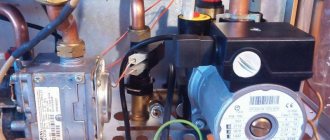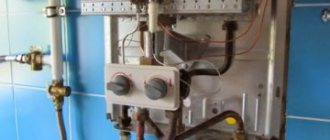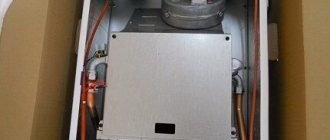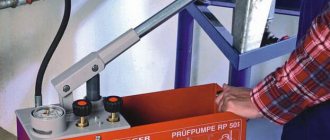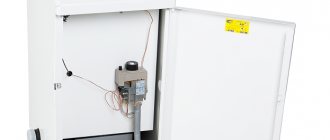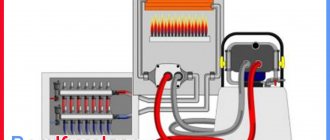My home is my fortress, and in a fortress everything should work like a clock. Agree, when returning from work, we dream of relaxing and enjoying the comfort, and not of repairing the faucet, boiler, or figuring out why the gas boiler is humming. However, it is extremely important to understand the causes of the problem when its first signs appear.
According to the rules for operating gas equipment, regular inspection and assessment of technical condition must be carried out by gas workers. But they cannot identify all impending problems in work, because are not required to visit clients daily. Therefore, it is very important to monitor the equipment yourself and know what to pay attention to.
In this article we will tell you what noise indicates when a gas boiler is operating, and why it whistles, hums, pops or clicks. Timely identification of the cause of sounds will help prevent breakdowns, extend the life of gas-consuming units, and make your life more comfortable and safe.
Causes of noise in heating equipment
The new gas boiler operates virtually silently. However, over time, the unit begins to make noise.
This is a sign of hardware failure:
- scale formation;
- the fan has failed;
- wear of device components;
- manufacturing defects;
- incorrect settings or installation of the boiler.
To understand why a gas boiler makes loud noise, you need to listen to the noise the equipment makes.
If the hum is heard directly from the boiler, then you should check the water level and add it if necessary. If noise is heard from radiators or piping, then air has entered the system and must be removed. Extraneous noise in the pump itself indicates a manufacturing defect.
Clicking sounds that occur at short intervals indicate problems with the fan. If the boiler hisses or whistles, it means that a lot of scale has accumulated in the device
If the circulation pump breaks down, this element often needs to be replaced. The gas supply to the system must be adjusted from time to time. High pressure is undesirable.
Problems with the exhaust fan
If extraneous noise occurs at intervals, you should check the fan. Its task is to systematize the operation of the smoke removal system, due to which combustion products are removed from the boiler with the intensity necessary to ensure the complete safety of others.
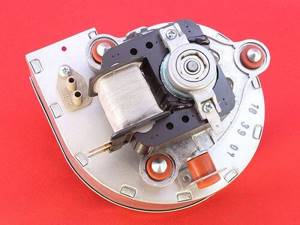
The fan blows through the system, clearing it of combustion residues, and also serves to remove smoke. The longer the boiler operates, the greater the fan wear
The main reason is age. Most likely, you just need to replace the fan with a new one. The second reason that leads to rapid wear of the cooler is its location above the burner at the top of the device.
Under constant exposure to high temperatures, the bearing lubricant quickly dries out, causing it to wear out. To fix the problem, you also need to replace the fan.
Another reason for the appearance of extraneous noise effects is that the part may be clogged with dust, to remove which you need to do the following:
- Inspect the fan. If necessary, it should be cleaned. The main blades are located inside the housing. You need to remove dirt and dust from them, and then lubricate the bearings.
- If the problem cannot be solved, replace the outdated valves with new ball valves.
- If the previous two steps did not bring results, reinstall the cooler.
It is better to entrust the replacement of parts to a gas boiler repairman from a service with which an agreement has been concluded for the maintenance of devices and the supply of blue fuel. Timely and competent replacement of worn parts will eliminate the need to buy a new unit.
Scale deposits on the walls of the heat exchanger
Thanks to the heat exchanger, heat is redirected from gas to water. If the water is hard, then scale may form in the heating system as it heats up. To remove mineral deposits deposited on the walls, it is recommended to regularly chemically flush the heating system and clean the heat exchanger.
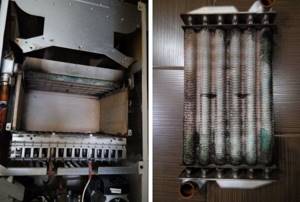
A household chemical for cleaning the heat exchanger can be purchased at the store. Craftsmen often use 4% vinegar for these purposes. After cleaning, parts should be rinsed with water.
This problem is noticeable after 15-20 minutes from the moment the gas boiler is started. The reason for the sound is the narrowing of the passage for water. As a result, steam and small bubbles are formed. Scale reduces the efficiency of equipment, as well as its heat transfer and wear resistance.
You can descale the unit using chemicals containing soda and similar substances. You can do this yourself. To do this, remove the heat exchanger, remove the casing and unfasten all connected pipes. A special chemical solution must be poured into the device for 2-5 hours.
Lack of water in the heating system
If there is not enough water flowing through the heating system, the boiler begins to make noise due to overheating. This is because air pockets form inside, interfering with the normal circulation of fluid in the system.
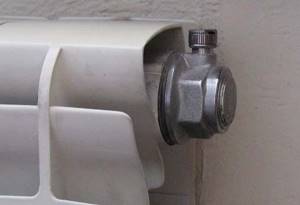
Airing the system leads to incorrect operation of the boiler. If there is not enough water in the pipe section, an air lock will form. At the same time, the heating device partially cools down, and water cannot circulate normally in the system, so it overheats by the burner. At the same time, a dull whistle or howl is heard
Airing leads to the following problems:
- the circulation of water in the coolant decreases or stops;
- The boiler automatically turns off due to overheating of the coolant.
Reasons why air ends up in the heating system:
- violation of sealing during repair work;
- violation of the integrity of the system;
- drainage of water from the DHW circuit.
To make the device work, you need to adjust the thermostat. You also need to make sure that the thermostat is installed correctly, add water, and adjust its supply and circulation.
The Mayevsky valve, which is mounted at the end of the radiator, will help get rid of air in the system. It has a fitting that, when opened, allows access to the inside of the battery. The faucet is most often installed at the top of the device, where warm air accumulates.
You can also use an air separator. The device collects air that collects into bubbles as water flows along the circuit. When excess air has been completely removed from the pipes, replenish the coolant through the make-up tap and make sure that the boiler operates without any extraneous sounds.
Arranging a perfectly sealed heating system will prevent the accumulation of air in the coolant. This is troublesome and expensive, but it will eliminate the occurrence of extraneous noise in the gas boiler.
Consequences of low pressure
Reasons why pressure in the system may decrease:
- water leak;
- breakdown of the boiler expansion tank;
- long interruption in electricity supply;
- Incorrect setting of the gas boiler.
If the pressure in the system drops, the boiler begins to make loud noises. Your task is to first check if there is a leak in the heating circuit. A simple napkin will help you with this; use it to wipe all joints and joints. Once the source of the leak is discovered, it must be eliminated.
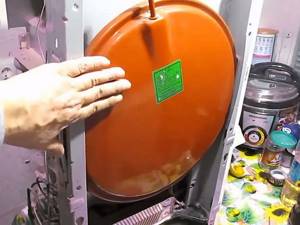
If the pressure in the system drops, the boiler stops working because it is blocked automatically. Lack of water in the heating circuit leads to overheating, it is detected by sensors, after which the boiler turns off automatically
The cause of pressure changes may be cracks in the expansion tank or heat exchanger. To identify their location, all water should be removed from the system, and then air should be pumped into it using a compressor. In places where microcracks form, air will leak out with a characteristic whistle. The appearance of microcracks indicates wear and the need for complete replacement.
This occurs as a result of frequent flushing of the system with chemical reagents, due to poor quality metal, a sharp increase in pressure in the line, and water hammer. If you can remove and repair the heat exchanger yourself, then you can try soldering the resulting microcracks.
To prevent such problems, it is recommended to regularly inspect the boiler, as well as install auxiliary equipment that will allow you to control the pressure by displaying the value on the screen. Standard pressure indicators are 1.5-2 atmospheres.
Incorrect unit setting
Incorrect adjustment or installation of equipment can also cause a valve or bypass to whine. Extraneous noise may occur as a result of improper load redistribution.
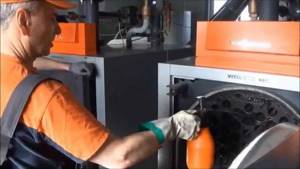
If the operating power of the unit exceeds the permissible values, vibration occurs as a result of excess pressure and the pump begins to rattle
If the sound of metal hitting metal occurs during heating or cooling, uncompensated heat expansion occurs in the device. The reason lies in incorrectly installed radiator mounting brackets.
If you don’t know why your gas boiler is constantly whistling, you should first check the settings. The rules and sequence of actions when setting up a gas boiler can be found in the technical documentation for the unit; operating parameters can be found on the nameplate attached to the equipment body.
Operating principle
The manufacturer uses metal to make the Baxi combustion chamber. On the outside it is covered with a layer of heat insulation. Above it there is a heat exchanger, which is made of copper. When there is a change in temperature in the room, the thermostat turns on. Please note that the launch is carried out automatically. From it the signal to turn on is transmitted to the pump. The latter creates a vacuum in the return pipeline. After this, heated water begins to flow into the heating system line under a pressure not exceeding 0.45 bar.
The boiler starts at low power.
It gradually increases until the temperature of the coolant increases to a given value. After this, the mode changes - from heating to modulation mode .
When the coolant temperature decreases, a signal is received from the temperature sensor, which leads to the opening of the inlet valve. After this, ignition occurs, and then the water is heated again. If already at the beginning of the boiler operation its power is quite high, then the burner is switched off automatically. After three minutes, you can restart the system.
If there is no need for heating the room, then the boiler is turned on in DHW mode. In this case, cold water enters the secondary circuit through a three-way valve, through which the heating line is closed. supplied to the burner through a gas valve , which leads to a gradual increase in boiler power. After heating the water, the temperature control mode is activated.
When the boiler is turned on, a popping sound is heard
If, when you turn on the gas boiler, you hear extraneous noises: pops, clicks, knocks, you should immediately start looking for the problem.
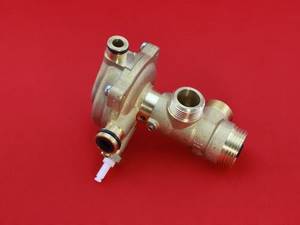
The three-way valve is the main component of a double-circuit gas boiler. Its task is to regulate the redistribution of flows when the hot water supply is turned on. If the cause of extraneous noise lies in the valve, it is faulty and the part needs to be replaced
What to do if the gas boiler slams sharply when turned on:
- Three-way valve malfunction. This device sends water in a small circle when drawing sanitary water from taps. If it clicks, it needs to be replaced.
- Prolonged spark ignition. When ignited, the resulting excess gas flares up and a characteristic pop is heard. In this case, it is recommended to check the igniter, burner, electrode, and all contacts.
- The chimney or filter is clogged. In this case, they need to be cleaned. The chimney is checked with a lit match. If the flame deviates, everything is fine; if there is no draft, cleaning is required.
- Installation error. If the equipment is installed incorrectly, but when heated, the metal is deformed and popping sounds are heard. The same sound occurs when it cools as the metal returns to its original position. When switching to hot water supply, the boiler hums. The problem is solved by reinstalling the gas boiler.
- The injectors are clogged. A thin wire is used to clean them. You must first turn off the gas.
If the boiler vibrates during operation, it is recommended to place a gasket under the body.
And the neighbors are noisy too
More often than not, it's not just you and your family who suffer this. Therefore, you first need to go around the neighbors along the riser to identify the location of the noise.
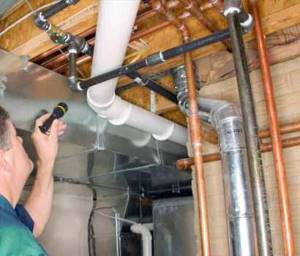
Let's find out where the pipes are making noise
Now, as for the nature of the buzz. Heating pipes, like water pipes, can emit single or rhythmic sounds, something like tap dancing, rustling, gurgling, or even generally vibrate and even hum – periodically or constantly. The reasons can be completely different, they are even classified into groups. But now we will not consider absolutely all of them, but will focus only on impact noise effects.
Note: The likelihood of noise in pipes is sharply reduced if you use metal-plastic or plastic pipes instead of metal and copper. This is explained by the high sensitivity of steel pipes to low-frequency vibrations and high rigidity. Although their material is much stronger. It is recommended to use ball valves rather than screw valves as shut-off valves, which are controlled by turning the handle. These are heavy cast copper products, not Chinese-made products made from light alloy material.
Causes of extraneous noise in various models
Why does the Navien gas boiler click regularly? There are two possible reasons: scale formation and problems with the coolant.
How to fix the problem yourself:
- disassemble the device;
- clean or replace the heat exchanger;
- check the taps;
- reduce the water temperature.
Extraneous noise is also observed during operation of Beretta brand gas boilers.
Typical reasons:
- poor heat transfer in the heat exchanger, scale formation;
- Wrong pipes are connected.
Why does the Concord gas boiler whistle? The most common reason is increased load in cold weather. The boiler power declared by the manufacturer does not correspond to reality and in practice the figures are lower.
For example, if the documentation indicates 13 mbar, then in reality it is 10 mbar. The device should not be set to maximum.
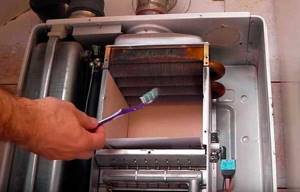
It is recommended to clean your gas boiler at least once a year. For this purpose, you can contact a service center or carry out the procedure yourself.
In a Baxi gas boiler, noise occurs most often when the heating function is turned on. To identify the cause, the bypass should be checked, and the valve should be cleaned and adjusted. Users of AOGV devices often complain about whistling. The cause is scale and a clogged filter.
Vailant boilers hum after turning on the heating function and turning off the fire. The first reason is that the heating circuit strainer is clogged; cleaning it will correct the situation. The second reason is a malfunction of the valve on the bypass line. Adjusting the valve will help solve the problem.
The cause of noise in Ariston boilers is poor coolant circulation. The problem will be solved by blowing the heat exchanger with a compressor. If the Ardelia gas boiler is humming, you should check that the pump settings are correct. If the situation cannot be corrected in this way, then it is recommended to replace it with a new circulation device.
The chimney is located in the wind pressure zone
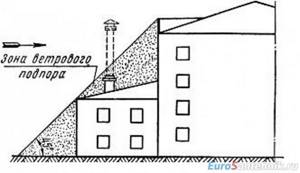
Wind pressure zone
What is a wind support zone? In fact, this seemingly complex concept can be explained quite simply and clearly. If there is a tall building or tree next to your chimney, then the wind pressure zone is a line that can be drawn from this nearby building or tree towards your chimney.
Conclusions and useful video on the topic
The reason for the noise during operation of the gas boiler:
Whatever gas boiler is installed in your home, first of all you should make sure that it is installed correctly. Equipment requires regular preventive inspection. This will allow problems to be identified and corrected in a timely manner.
It is recommended to periodically clean the coolant from dirt and scale. These simple manipulations will allow the device to work as long as possible, efficiently and without extraneous noise.
Have you ever encountered a gas boiler that slams, clicks, whistles or makes noise? How did you resolve this problem, or what services did you contact? Share your experience with readers in the comments and ask our experts any questions you have.
Pilot safety circuit problem
The safety circuit is mainly represented by either a traction sensor or a limit thermostat - special devices that are able to detect any problems in time.
All protective equipment located there must be checked. Often these contacts become sour and need to be cleaned thoroughly. If you have sour contacts somewhere, then there will be no interaction. If there is no contact when you try to light the wick, you will simply knock out the automation.
If the wick of a gas boiler deviates slightly from your ionization electrode or thermocouple, the voltage that remains on your sensor may simply not be enough to keep the valve open and the wick goes out. Therefore, it is imperative to check the safety circuit contacts of your boiler. This is a draft sensor, a limit thermostat, and a thermocouple.
